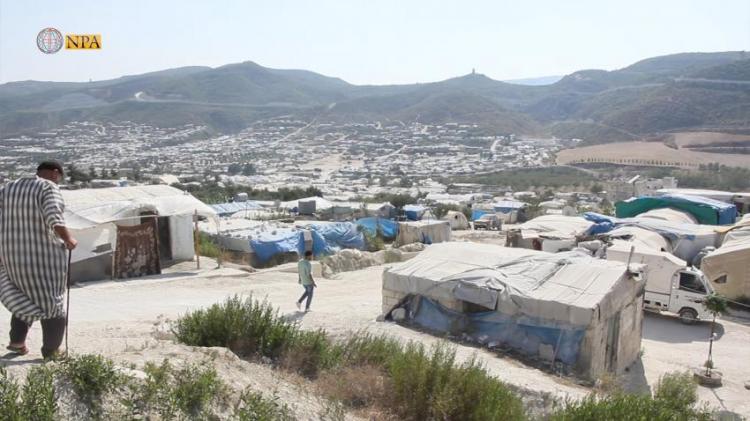Ongoing displacement waves amid clashes and bombardment in Idlib
Baraa Darwish
New internally displaced people camps and other harsh scenes of civilians flee the clashes and bombardment in villages and towns of the southern countryside of Idlib.
The systematic bombardment and the military advancement of the Syrian government forces within controlled areas of the armed opposition groups have caused large displacement waves.
New waves
The camps of Khirbet al-Jawz and Ain al-Baida in the western countryside of Idlib, which are located on the Syrian-Turkish borders, have witnessed a large and continuous influx of displaced people fleeing the rockets and shells to exceed 75,000 IDPs, some of whom live in tents while others are still looking for shelter.
In the past few days, about 100 new displaced families have arrived, they were distributed to several camps in the area.
Unemployment and needs
Haifa Haj Mahmmoud, a resident of Ain al-Baida camp told North-Press: “We’ve been here for a while, sheltering in the camps that are close to the Turkish borders”.
Regarding living situations, Haifa said: “We suffer poor living conditions, we all barely manage to live in tents that neither protect us from the heat of summer nor the cold of winter”.
Haifa added: “All people are unemployed due to the war and fighter-jets shelling, which led to the spread of poverty and made it difficult for everyone to manage their living, after they had lost everything and left behind when they fled”.
Haifa appealed for help, asking about the situation of 75,000 displaced people, “Is it reasonable that this large number will stay in the camps under these difficult circumstances?”
Ongoing displacement
Mohammed Laith, the manager of the camp told North-Press: “Over the past few months, there have been constant and continuous displacement waves into the area, but over the past 10 days, as the Syrian regime intensified its military campaign and shelling, the number of IDPs in the area has increased dramatically and reached 100 families in one wave”.
Mohammed pointed out that the IDPs suffer from several things, the most important of which is the need for emergency assistance, where they are in need of shelter, sponges, food and emergency medical centers, which is difficult to provide because of the limited capacity of the supervising local councils.
The situation remains difficult and suspended due to the absence of humanitarian relief and medical organizations.
While a timid move by some international organizations to assist the large numbers of displaced people in northern Idlib, the military operations and shelling continue in the de-escalation zones in northwestern Syria.

